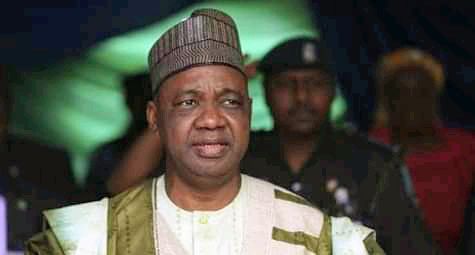Former Nigerian Vice President, Arc. Namadi Sambo has pointed out that Architects must hold themselves to the highest standards of professional conduct, ensuring that their projects are executed with transparency, fairness, and commitment to excellence.
The ex-Vice President who disclosed this at 2024 Archibuilt Expo in Abuja on Tuesday where he was made the Special Guest of Honour said, Architects need to stand as leaders in construction field and to rise to the immense responsibility that comes with this role.
According to him, “Architecture is more than just a profession; it is a calling that demands vision, integrity with much more deep sense of responsibility. As architects, we shape the spaces where people live, work, and interact.  “Our designs influence the quality of life, the efficiency of businesses, and even the health and well-being of communities. With such power comes responsibility to ensure that our work serves greater good. Leadership in architecture isn’t about technical expertise; but about ethical responsibility”, he said.
“Our designs influence the quality of life, the efficiency of businesses, and even the health and well-being of communities. With such power comes responsibility to ensure that our work serves greater good. Leadership in architecture isn’t about technical expertise; but about ethical responsibility”, he said.
Sambo pressed further that architects must also advocate for protection of the cultural heritage, ensuring that their designs respect and preserve unique identity of communities. He said, “Furthermore, as leaders, we must be vocal advocates for the importance of architecture in national development.
“We must engage with policymakers, stakeholders, and the public to emphasize the role that thoughtful, well-designed infrastructure plays in building a prosperous and sustainable nation. “Our leadership should extend beyond our projects and into the broader discourse on how architecture can address the social, economic, and environmental challenges facing Nigeria”, the former Vice President added.
“Our leadership should extend beyond our projects and into the broader discourse on how architecture can address the social, economic, and environmental challenges facing Nigeria”, the former Vice President added.
Speaking on this year’s exposition: “Innovations in Sustainable Construction”, Architect Sambo said this is not just only timely but critical, adding that since architects stand at the crossroads of a rapidly changing world, their roles extends beyond the mere creation of structures.
He said architects are custodians of the future, noting that their designs must not only meet the aesthetic and functional needs of today but also address the pressing demands of tomorrow. “We must commit to building sustainable and affordable buildings with materials that are sourced locally.
“In a nation blessed with abundant natural resources, it is imperative that we leverage these resources to create architecture that is both environmentally responsible and economically viable.The global push for sustainability is not just a trend; it is a necessity.  The former Vice President also noted that the planet’s resources are finite, and the construction industry is one of the largest consumers of these resources.
The former Vice President also noted that the planet’s resources are finite, and the construction industry is one of the largest consumers of these resources.
According to him, “As architects, we must lead the charge in reducing carbon footprint of our buildings by embracing materials that are not only sustainable but also locally available.
“This approach reduces transportation costs, supports local economies, and ensures that our buildings are in harmony with the environment in which they are situated, Architect Sambo added.
He emphasized that sustainable energy solutions must be integrated into architect designs, while named solar panels, energy -efficient lighting, and advanced insulation techniques has some of just few of the ways architects can reduce the energy demands of their buildings.
Sambo said, “By designing structures that generate as much energy as they consume, or even contribute surplus energy back to the grid, we can help Nigeria transition to a more sustainable and energy-independent future.
“But sustainability must not come at the cost of affordability. Our challenge is to create buildings that are both green and accessible to the majority of our population. This is where innovation comes into play.
“We must explore new construction techniques, modular designs, and materials that can bring down costs without compromising on quality or sustainability. The goal is to make sustainable living a reality for all Nigerians, not just a luxury for the few”, he said.
Addressing the critical issue of population growth and its implications for architects work, the former Vice President revealed that Nigeria’s population is set to almost double over the next 25 years, adding that this demographic shift presents both a challenge and an opportunity for architects.
He said to accommodate this growth, architects must think beyond individual buildings and consider broader implications of their designs on cities and regions, saying urbanization is inevitable, and with it comes the need for infrastructure that can support larger, more densely populated areas.
“We must reimagine our cities, not just as collections of buildings, but as dynamic, interconnected ecosystems. This means designing infrastructure that is resilient, adaptable, and capable of meeting the diverse needs of a growing population.
“We must prioritize the development of affordable housing, ensuring that every Nigerian has access to safe and dignified living conditions. But housing alone is not enough. We must also design cities that promote mobility, reduce congestion, and enhance the quality of life for all residents”.
This, the former Vice President said includes investing in public transportation systems, creating green spaces, and developing mixed -use neighbourhoods that bring people closer to the services they need.
“Moreover, we must be proactive in addressing the infrastructure needs of rural areas to prevent the overburdening of urban centres. By developing sustainable, self sufficient communities in rural areas, we can help balance population growth and ensure that all regions of Nigeria benefit from development”, he said.
The former Vice President extended his sincere appreciation to the leadership of the Nigerian Institute of Architects for inviting him to this Exposition while urged them to remember that the future of Nigeria’s built environment is in their hands and choices they make today will shape the lives of millions of Nigerians tomorrow.














